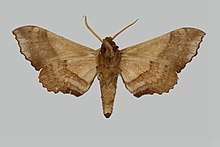Rufoclanis numosae
Rufoclanis numosae, the wavy polyptychus, is a moth of the family Sphingidae. The species was first described by Hans Daniel Johan Wallengren in 1860. It is known from dry bush and arid savanna in much of eastern and southern Africa.[2]
| Wavy polyptychus | |
|---|---|
_(13923415895).jpg) | |
 | |
| Scientific classification | |
| Kingdom: | Animalia |
| Phylum: | Arthropoda |
| Class: | Insecta |
| Order: | Lepidoptera |
| Family: | Sphingidae |
| Genus: | Rufoclanis |
| Species: | R. numosae |
| Binomial name | |
| Rufoclanis numosae (Wallengren, 1860)[1] | |
| Synonyms | |
| |
The length of the forewings is 22–30 mm for males and 34–36 mm for females and the wingspan is 54–58 mm. The wings are greyish pinkish brown to light brown with an evenly curved oblique post-medial line on the forewings and numerous dark wavy lines on the hindwings. There is also a faint dark spot at the base of the forewings and a prominent reniform stigma, as well as two dark spots at the tornus of the hindwing.
Subspecies
- Rufoclanis numosae numosae (Democratic Republic of the Congo, Tanzania, Namibia, Zimbabwe, north-eastern South Africa)
- Rufoclanis numosae rostislavi Haxaire & Melichar, 2009 (Ethiopia)
- Rufoclanis numosae subjectus (Walker, 1869) (Somalia, Kenya, Tanzania, Zambia)
gollark: Hmm. BF to WASM sounds practical and easy.
gollark: Java. Java? Java...
gollark: It's case sensitive...?
gollark: This means it is considered a language by codegolf SE unless they changed that.
gollark: L means primaLity test - read number, print whether number is prime or not.
References
- "CATE Creating a Taxonomic eScience - Sphingidae". Cate-sphingidae.org. Archived from the original on 2012-03-31. Retrieved 2011-11-01.
- Carcasson, R. H. (1967). "Revised Catalogue of the African Sphingidae (Lepidoptera) with Descriptions of the East African species". Journal of the East Africa Natural History Society and National Museum. 26 (3): 1–173 – via Biodiversity Heritage Library.
This article is issued from Wikipedia. The text is licensed under Creative Commons - Attribution - Sharealike. Additional terms may apply for the media files.